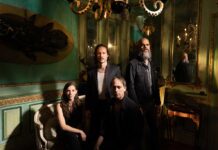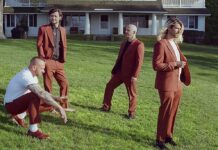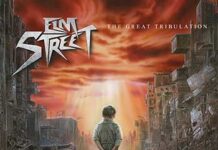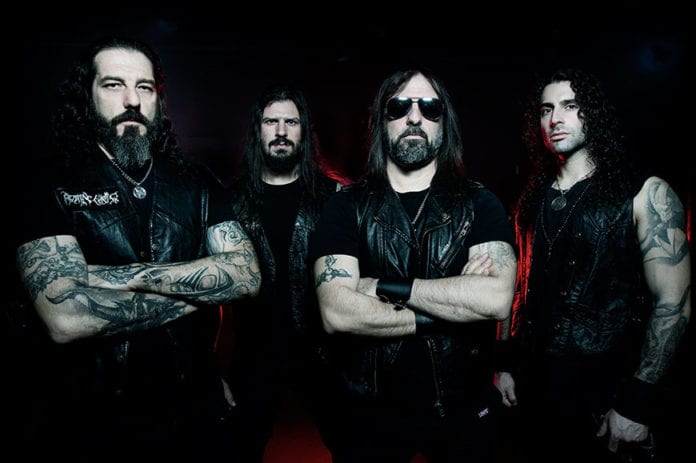
Interview with guitarist/vocalist Sakis Tolis by Kevin Stewart-Panko
Photographs by Ester Segarra
The Greeks may have invented mythology, philosophy, the Olympics, and ridiculously delicious yogurt, but Athens based heroes Rotting Christ are a true Grecian success story. When Sakis Tolis and his younger brother Themis formed the band in 1987, the world was a larger and less connected place, and the isolation facing a politically motivated grindcore band was daunting to say the least. After a musical shift towards black metal and the attracting of the attention and respect of the genre’s early progenitors, the brothers put their heads down and haven’t stopped since. Their tireless forward motion has grown the band from obscure curiosity to one of the most recognizable names in the international underground.
Of course, there’s been controversy and hardship. They’ve been called out by scads of Christian conservatives, US politicians, and Dave Mustaine. They’ve been put in the crosshairs of governments in Malta, South Africa, and others. And, as late as last year, the Tolis brother spent a couple days in the hoosegow in Tbilisi, Georgia on baseless and trumped up charges. None of this has put a pin in the compunction of Sakis Tolis to write vibrant, anthemic, and triumphant melodic black metal while standing on rooftops and bellowing anti-religion screeds and dispatches about freedom of speech.
We connected with the vocalist/guitarist via Skype to discuss the band’s latest and 13th album, The Heretics, during which he displayed a remarkably improved command of the English language while yakking about fighting the good fight, Canada being the true home of liberty, how the Greek banks almost killed a dream, and not meaning it when you say, “Go fuck your mother!”
You have been countering religion since the beginning of Rotting Christ. How much of a driving force does religion remain for you these days?
Actually, it’s not that much anymore, but don’t forget that we live in a part of the world that is between Africa, Asia, and Europe, which means you have three civilizations here that are mixed, and the religions represented here are always trying to attract more people. So, there’s still a problem. On the other hand, I think in general that religion is not as strong as it was. But you know, for me, it makes sense to fight for something, and in some territories freedom of speech is not a thing. For people who live in the States, you have the right to say whatever they want, but believe me, if you live in some other territories it’s a big problem. So, I think that this is part of the reason Rotting Christ plays all around the world, not only in Western civilizations. We’ll play wherever they call and ask us. We’ll play under very difficult conditions—don’t forget last year we were put in jail in Georgia—and we’ll play everywhere because we’ve found that purpose. Music is good and playing it is great, but I want to fight for something, and I think that this makes sense.
When you have problems like you did in Georgia last year, like South Africa, like Dave Mustaine getting you kicked off festival bills, do these still surprise you?
(laughs) Yes, yes, yes! But “Non serviam” [also the title of the band’s second album from 1994] is our main motto—I don’t obey you, use your mind, be yourself. This is something that some countries and governments don’t want for their inhabitants.
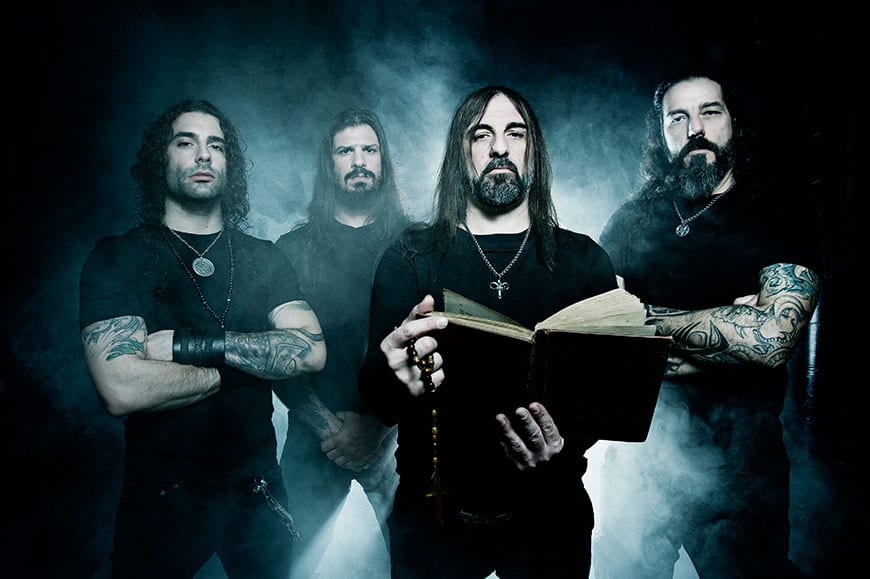
“WE DON’T HAVE A PROBLEM WITH WHAT PEOPLE CHOOSE TO BELIEVE. WE HAVE A PROBLEM WHEN SOMEONE ORGANIZES AND EXPLOITS THE BELIEFS OF THOSE PEOPLE.”
When you have nations singling you out, or throwing you in jail for speaking up, do you ever think, “Holy shit, we’re taking on an entire government?”
(laughs) For instance, we were to play in Malaysia years ago and the show was confirmed, but the government said no. Someone from the government found a poster for the show, so they cancelled it. Things like this happen. But we are Rotting Christ, and when I say Rotting Christ, it’s not just about religion. We don’t have a problem with what people choose to believe. We have a problem when someone organizes and exploits the beliefs of those people. This is what we call lack of mind and a lack of freedom, and this is what we are fighting for.
Do you find yourselves experiencing trouble with the band’s name even in those countries you’ve successfully toured?
No, not really. In the US and parts of Europe, we’ve had cancelled shows and small riots, but we still just do our thing. Where are you from?
Canada.
Oh, Canada! I assumed you were from the States, sorry! Actually, you live in what is probably the most free country in the world, and I mean that. I’ve travelled to a lot of countries, and Canada is, I think, the most free place I’ve been to.
Does the Rotting Christ name ever cause problems when applying for visas?
Not really, because we don’t usually put the band’s name on the applications, just our given names.
When you got down to writing the new record, were you thinking of doing anything differently?
Not exactly. I’m quite satisfied with the way I’ve been doing things over the past 10 years. I am the only composer in the band and have been since the early days. I’m the person who spends countless time with a guitar trying to find something new. In the last 10 years, I’ve also been doing the production by myself, too. So, in that way, things haven’t changed much. I’ve just followed a path that has been quite successful over the last 30 years. The composition process is a very serious thing, and I pay a lot of attention to this. In the past, I would write songs just playing guitar. Now, I first think about it, think about what I want to do and write, then I grab the guitar. This is the difference in the last 10 years and this is the reason we are currently in a different era for the band.
Is there ever any conflict with the other guys wanting to be give more input, write songs, and contribute with their creativity?
No, they know this is the way it is. Me and my brother have been in the band together since the beginning, and we have had a lot of fights. You can understand when you have two brothers in a band, you can easily say, “Fuck your mother,” or something (laughs). It happens often, sorry to say, even if we love our mother. On the other hand, he’s a person I can trust. He’s the drummer, so he’s never involved in the actual music writing. Of course, the other guys help and they are very useful, they love the band, and they help in the studio, but they don’t really write music for Rotting Christ. They have other projects in which they write music.
Does your mother know you say, “Fuck your mother,” to each other?
(laughs) Yes. I know, I know, but we don’t mean it that way. Two brothers in a band can be like, “Wow!” but he’s also the only guy I can trust 100 percent. He’s the guy who you know can help out in a really difficult situation. We’ve been doing this for 30 years together, and we just go on.
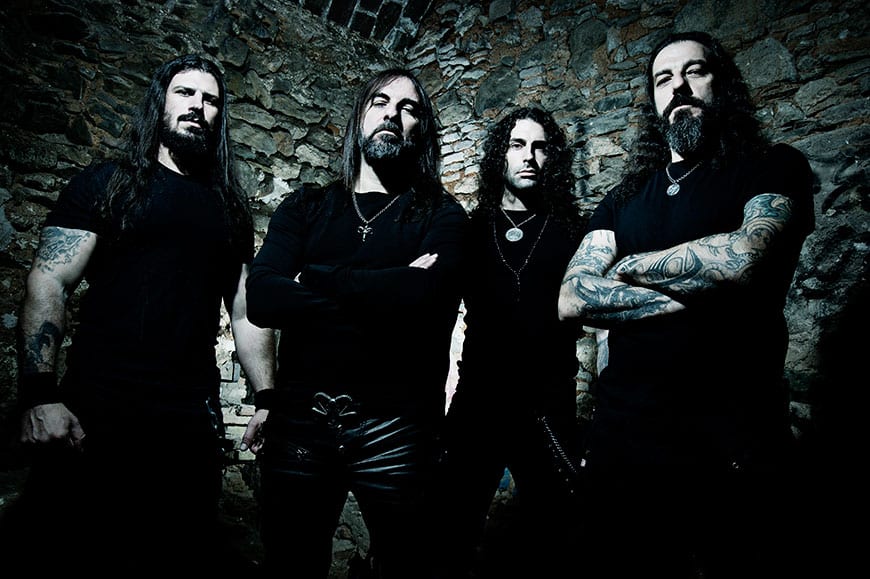
How do you think your relationship would be different if you didn’t have Rotting Christ? If you were an accountant and he was a gardener, and you weren’t in a band?
Oh, no. We’d kill each other! (laughs) But being in the band, we have the same vision, and that’s very important. We have a vision together, we have made sacrifices in our life, we’ve done a lot of things that most people don’t do. Especially in the 80s and 90s, when people we knew were trying to find proper jobs, we chose to take a train and bus and tour the world without proper income, sleeping wherever we could find, and having those experiences. We share this, so we can’t have that bad a relationship. Of course, there is tension, especially when you record an album, but this happens to everyone in every band.
“I WOKE UP ONE DAY AND REALIZED THAT I’M A HERETIC PERSON WITH THE PATH THAT I’VE CHOSEN.”
What the story behind calling the new album The Heretics?
I woke up one day and realized that I’m a heretic person with the path that I’ve chosen. This doesn’t go with the flow and is not the norm. Everything I’ve chosen, especially back in the day, was considered quite heretic. I read a lot of history and poetry. I realized that there have been many people who have been considered heretics throughout time, and I found a lot of things in common. So, I started to write an album influenced by all those people.
How long had the album been in the works?
It’s been going on for a while. I think a lot as a person and try to write down all my ideas. I try to make myself better and take steps upward in my life, mentally at least. So, I’m never writing albums to just go on tour or to fulfill a contract. I first have to feel the vibe before I can come out with anything that would be on an album. This is what I did, and it took me a lot of time to compose and record.
How much of a challenge was creating the Russian inspired track “Vetry Zlye?”
When you write a song about paganism, it can be difficult. I said, “It’s a Slavic song, it’s a pagan song,” let’s find the one Slavic person I know who could help me make something in Russian. So, I wrote down everything in English—because it’s easier for me to write in English even though it’s not my mother tongue—and he translated it into Russian to come up with the song, which is an ode to Mother Nature. And the singer on it is Irina Zybina, a friend of mine who is Russian. Everyone who contributes on the record is a personal friend of mine.
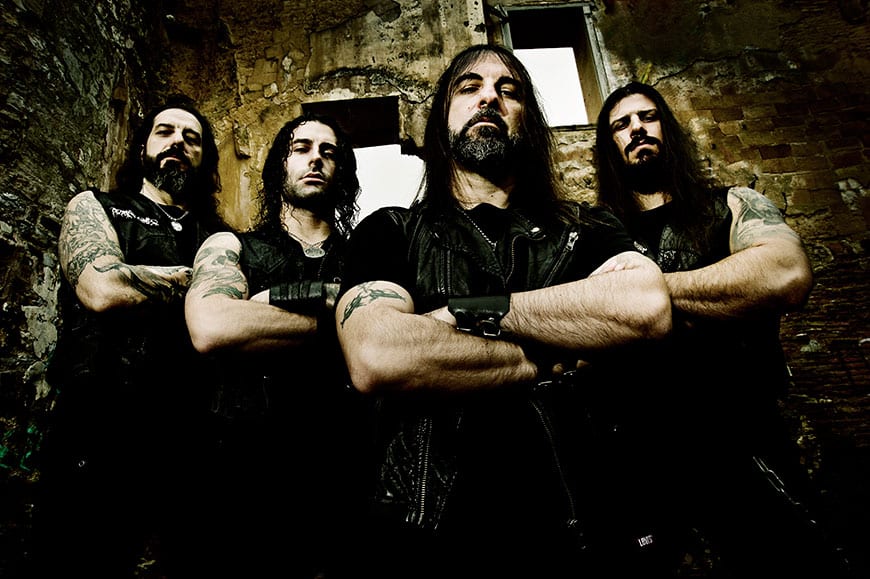
“THE BAND IS CALLED ROTTING CHRIST, SO THE MUSIC SHOULD BE DARK, SATANIC, AND ATMOSPHERIC.”
As you grow and progress, do you ever worry about what you write might step too far outside of what you’ve established with Rotting Christ?
Yes, this is my one big real worry. I have too many ideas, and when it’s time to write I try to stay close to where I started, close to my path. The band is called Rotting Christ, so the music should be dark, Satanic, and atmospheric. I’m always trying to keep on this path.
As someone who prides himself on standing outside normal Greek society, how was it for you when the country experienced the worst parts of the economic collapse a decade or so ago?
It was the worst experience of my life. I never really paid much attention to money, what money I had, and what money I spent, because money to me is something that’s not real. On the other hand, when you are living in bankrupt conditions and you see people in the streets scrounging, you see criminality on the rise, it’s like, “What the fuck is going on here?” I realized that I’m still a normal person whose life is controlled by the banks, and when the banks weren’t open or accessible for a few days, it’s like my crazy, romantic world I’ve been living in got fucked up. With this experience, you become a more regular person surviving to pay bills, which I didn’t like.
Given that Rotting Christ’s income comes from a variety of sources, like royalties, merch sales, publishing, and touring, did the economic collapse impact you as harshly as it did the regular population?
Yes, yes it did because we didn’t actually have access to that money. Banks were closed, and there were capital controls, which meant you could only withdraw 500 or 1,000 Euros a month from your bank account. How can anyone live like that? Even if you have income coming in from out of the country, you still have to be able to get to it, and the government didn’t allow us to. It’s things like that that make you realize we’re living in a world of our own, but that this is the greatness of metal music—the escape. Some people take drugs, some people drink alcohol, we have our music and this helps us to escape from everyday life.
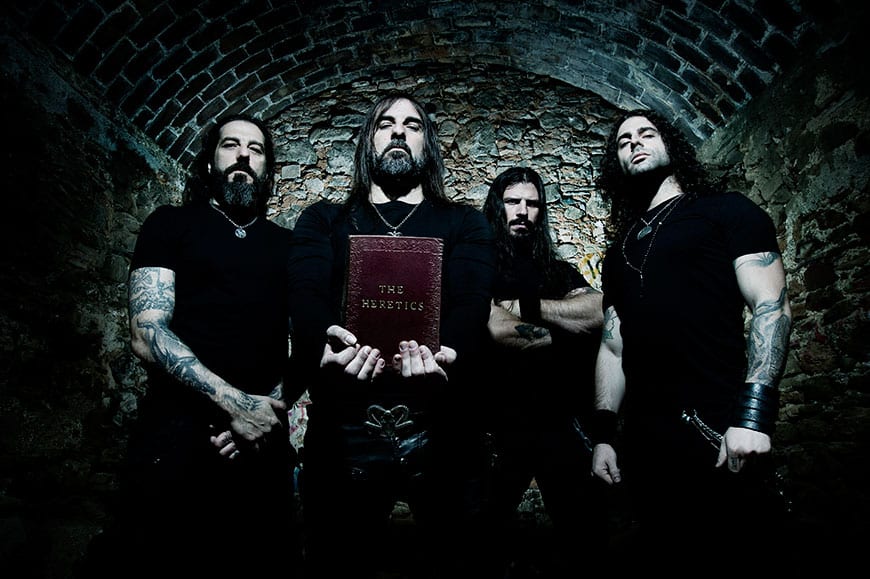
In the last couple of years, you’ve been involved in two books, Under Our Black Cult and Non Serviam, which you co-wrote with Black Metal: Evolution of the Cult author Dayal Patterson. Did you think you’d ever come close to being a published author?
Oh no. I never thought I would, or could, ever write a book in my life. But Dayal mentioned, “You have had a band for 30 years. Do you want to write about it?” At first, I was like, “No way!” But I thought that it was something I’d like to do before I die. So, I started to talk with Dayal a lot about the history of the band, the early days, and we came up a biographical history that includes some strange stories, but it’s a quite honest book. I’m very glad that in the end I became a better person, because I remembered who I am and where I came from and this is very important. I had to force myself to remember my past.
Regardless of how long you’ve been at this, there are always lessons to be learned. What would you say are some of the lessons you’ve learned since Rituals and how have they been applied to The Heretics?
With the last two albums, I’ve paid a lot of attention to the promotion. I used to be the guy who’d release an album and never checked in with my label about how it was promoted, what the promotion schedule was like, and blah, blah, blah. I figured it was time to be a part of this and it was time to push the album the way I would like. This is what I’ve done with the last two albums, and I think this is part of the reason the band is getting more hype. I also contribute in the promotion style. I have some rules that go back to the old ways of doing things. Sometimes you have labels, newcomers, and new people who want to promote the band the same way as everyone else. I respect that the promotion has to be done, but I also respect our fans and don’t want it to be that we’re just after their money. I understand the labels are also trying to survive, but on the other hand it’s very important when I hear people say, “Sakis, you made my day with your music.” That makes me very rich, and some people don’t understand. This is the spirit we had back in the day. We are currently living in a strange and weird world, and I want to try and keep a little bit of the old ways alive today.

https://www.rotting-christ.com/en
https://www.facebook.com/Rotting-Christ-290468585669/








